At 10 a.m. on March 16, the "Innovation and Co creation" Sino Japanese Enterprise Innovation Cooperation Forum was held in the Oriental Hall of Kaiyuan School of Law, Shanghai Jiao Tong University. The meeting was hosted by Shanghai Jiaotong University and the Consulate General of Japan in Shanghai, organized by the Japan Research Center of Shanghai Jiaotong University and the Carpenter (Shanghai) Business Incubator Management Co., Ltd., and hosted by the Japanese Trade Promotion Agency (JETRO) Shanghai Office, Japan China Science and Technology Cultural Center, Japan China Economic Association Shanghai Office, Shanghai Japan Business Club, Shanghai Science and Technology Exchange Center, Shanghai Jiaotong University Innovation and Entrepreneurship Association The Legal Branch of Shanghai European and American Students Association acts as a backup unit, and the titanium media acts as a special cooperative media. Akio Yoshimata, Consul General of Japan in Shanghai, Xu Xuemin, Vice President of Shanghai Jiaotong University, Fukuda Gaogan, Minister of Politics, Economy and Culture of the Consulate General of Japan in Shanghai, Professor of the Department of Business Management Studies of Hitotsubashi University, Jiang Jinzhang, Vice President of the School of Cultural and Creative Industries of Shanghai Jiaotong University - University of Southern California, Yamauchi, CEO of Amuse Asia Business Unit, Zhou Qi, President of China Science and Technology Innovation Culture Group Zhu Hui, Chairman of China Science and Technology Innovation Culture Group, Lin Haijian, General Manager of Guohe Investment, Cui Jingjing, Chairman of Huaya Film, Zhao Hejuan, CEO of Titanium Media, Li Xiaojun, Director of the West Taihu National Medical Equipment International Innovation Park, Li Zhongfei, Director of the Investment Promotion Bureau of Yangzhou National High tech Industrial Development Zone, Yu Jiaxiang, Deputy General Manager of Pudong Science and Technology Innovation Group, Wu Bin, Deputy Director of the Equipment Development Department of Sinopharm Holdings, CEO of Pegasus Travel Group Qian Qian, an individual LP of Ruifeng Capital, Ding Jian, Secretary of the Party Committee of the School of Foreign Languages of Shanghai Jiao Tong University, Deputy Director of the Japan Research Center, and Tian Zhongnian, CEO of Jiangjixin (Shanghai) Entrepreneurship Incubator Management Co., Ltd. attended the forum on the first day of the year. The forum attracted nearly 250 people from governments, courts, colleges and universities, law firms, state-owned enterprises, private enterprises and other institutions.

At the beginning of the meeting, Ji Weidong, director of Japan Research Center of Shanghai Jiaotong University, presided over the opening speech, keynote speech and special report. Director Ji Weidong, on behalf of the sponsor and the organizer, extended a warm welcome to the guests from afar.
Subsequently, the host and the organizer respectively delivered opening speeches to the meeting. The new Consul General of the Japanese Consulate General in Shanghai, Akio Yoshimata, focused on the core issues of this session, gave a brief introduction to Japanese experts and scholars attending the session, and expressed his ardent hope and sincere wishes for the session.
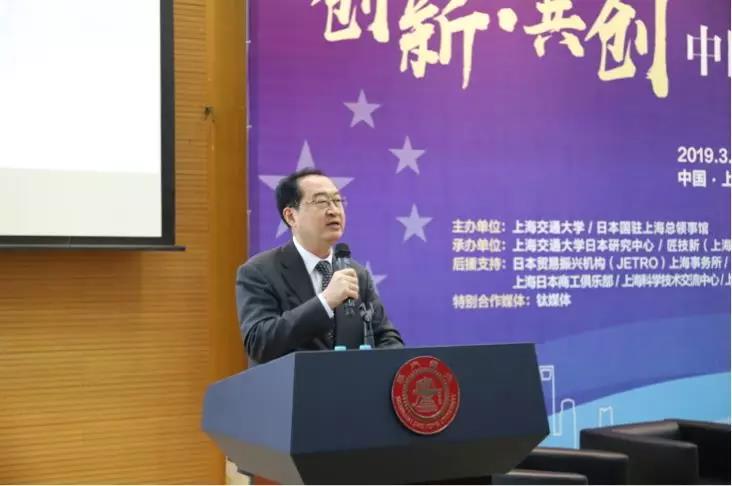
Chaired by Ji Weidong, Director of Japan Research Center of Shanghai Jiaotong University

Japanese Consul General Akio Jimata delivered an opening speech in Shanghai
Xu Xuemin, Vice President of Shanghai Jiaotong University, briefly introduced the functions of the Japan Research Center of Shanghai Jiaotong University and the new opportunities for China Japan cooperation, and put forward his own outlook on the promotion of China Japan cooperation by the conference.
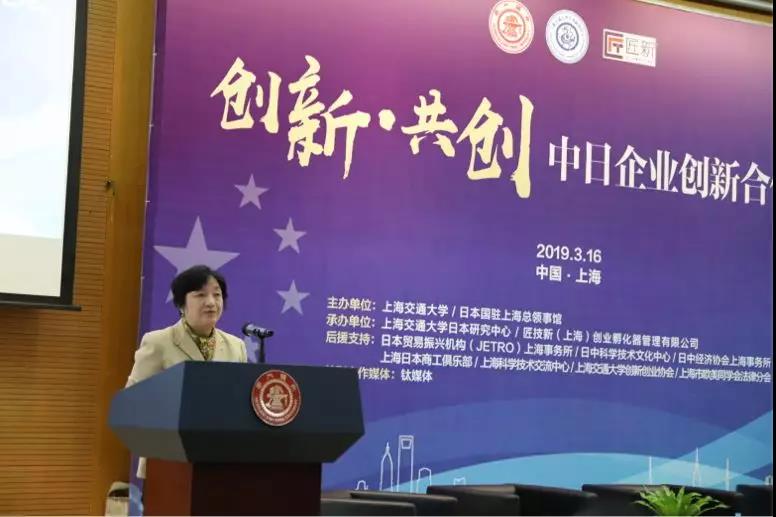
Xu Xuemin, Vice President of Shanghai Jiaotong University, delivered an opening speech
Tian Zhongnian, CEO of Jiangjixin (Shanghai) Entrepreneurship Incubator Management Co., Ltd., delivered a speech on behalf of the organizer. He used vivid examples to show the participants the great value that China Japan cooperation can create, which caused warm applause from the audience.
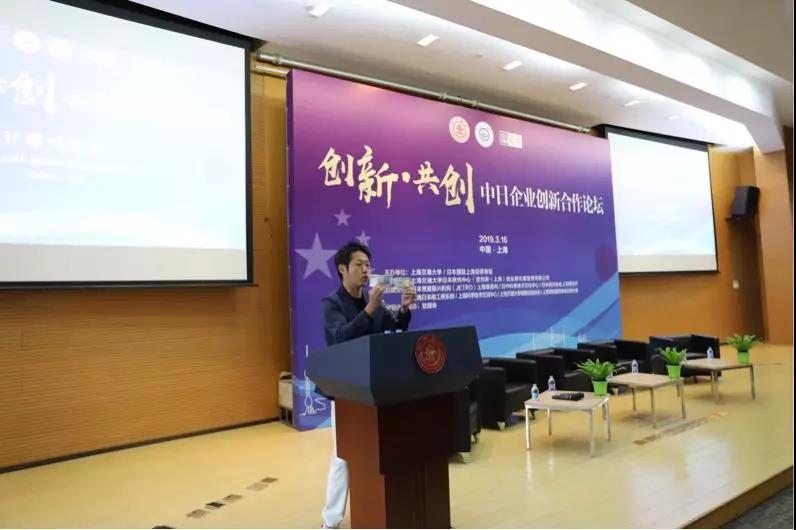
Tanaka, CEO of Jiangjixin (Shanghai) Entrepreneurship Incubator Management Co., Ltd., delivered an opening speech
Subsequently, the meeting officially started, and the professor from the Innovation Research Center of the Business Management Research Division of Yiqiao University made a keynote speech first. Focusing on the innovation history of Japanese enterprises, he first reviewed and reflected on the past and present innovation history of Japan, and then looked forward to the development of Japan's innovation industry. Taking Toyota as an example, he highly summarized the innovative characteristics of Japanese enterprises. He proposed that the innovation of Japanese enterprises is mainly reflected in four aspects: their strong independent learning ability, catching up with competitors, maintaining close relations with suppliers, and the sense of mission and vision of operators. Later, he further proposed that the Japanese innovation model currently faces certain challenges. He believed that under the impact of the scientific and technological society, Japan's development speed was slightly insufficient. Finally, the professor of the Ministry of Light Education proposed that only when China and Japan cooperate and make progress together can they truly achieve innovation.
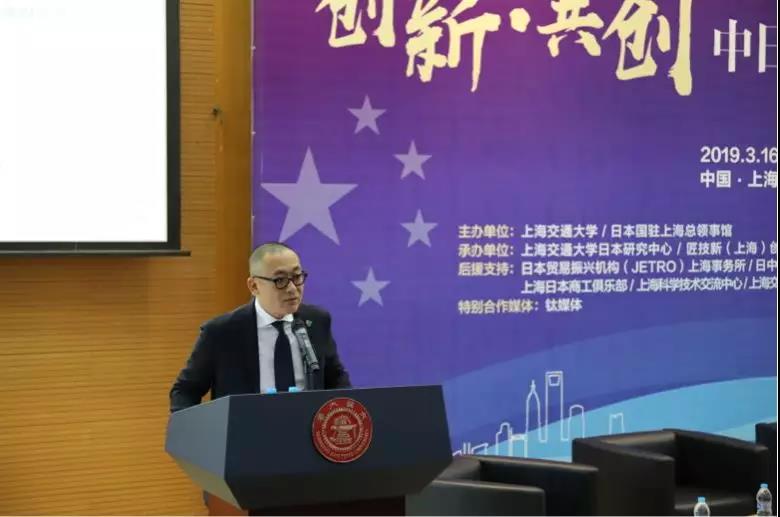
Professor of the Innovation Research Center of the Business Management Research Division of Yiqiao University made a keynote speech
Jiang Jinzhang, Vice Dean of the School of Cultural and Creative Industries of the University of Southern California, Shanghai Jiao Tong University, made a keynote speech on the current situation and characteristics of the development of cultural and creative industries in Shanghai. He first reviewed the history of cultural and creative industries in Shanghai. Later, he made a detailed analysis of the overall scale and structure of the cultural and creative industry in Shanghai. He pointed out that Shanghai's cultural and creative industry would have more room to develop and would be further improved in imports. At the same time, he also proposed several development goals for the development of cultural and creative industries in Shanghai. For example, the growth value of cultural industries in the city will reach about 15% in 2022, 18% in 2030, and a cultural and creative industry center with international influence will be built in 2035.
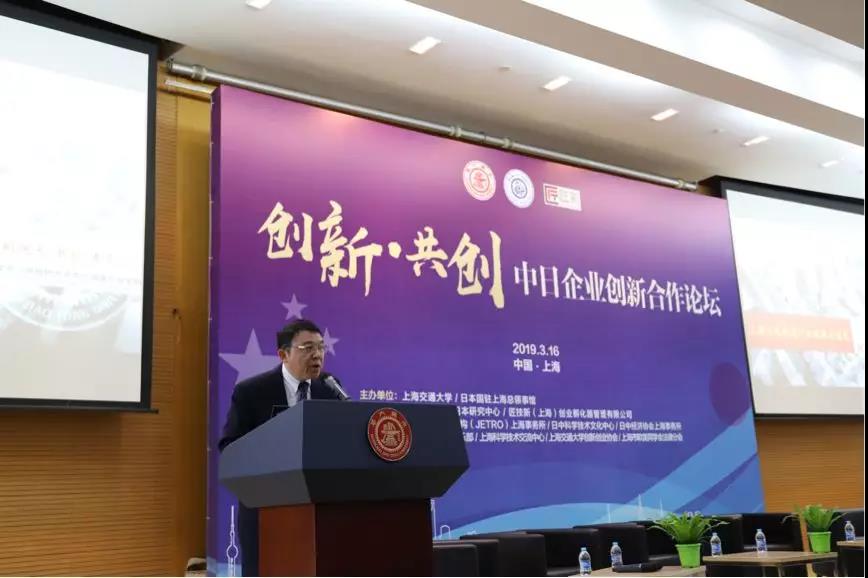
Jiang Jinzhang, Vice Dean of School of Cultural and Creative Industries, University of Southern California, Shanghai Jiao Tong University, made a keynote speech
Yamauchi, CEO of Amuse Asia Business Unit, further made a special report on the arrival and practice of the Sino Japanese co creation era in the cultural and entertainment field. He pointed out that since Amuse was established in Shanghai in 2013, it has closely cooperated with Chinese companies in many fields. He believes that their goal is to bring Japanese culture and some new cultures into China, integrate the preferences and cultures of local audiences, and carry out in-depth cooperation with China, so as to make cultural products that truly bring visual enjoyment to the audience. At the same time, from the perspective of innovation, he hopes that more young people can integrate into it and create more products with vitality.
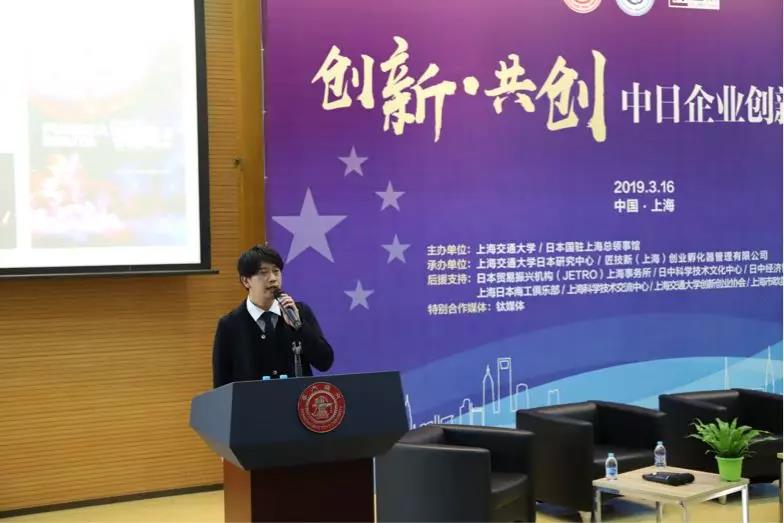
Special report by Amuse Asia Business Unit CEO Yamauchi
After the speech, the first half of the meeting ushered in the last agenda - a round table discussion entitled "Innovation in the field of culture and entertainment and the possibility of Japan China co creation". Fukuda Gaogan, Minister of Politics, Economy and Culture of the Consulate General of Japan in Shanghai, served as the moderator of the discussion. Shanneixue, CEO of Amuse Asia Business Unit, Zhu Hui, Chairman of China Science and Technology Innovation Culture Group, Lin Haijian, Managing Director of Guohe Investment, and Cui Jingjing, Chairman of Huaya Film, participated in the round table discussion.
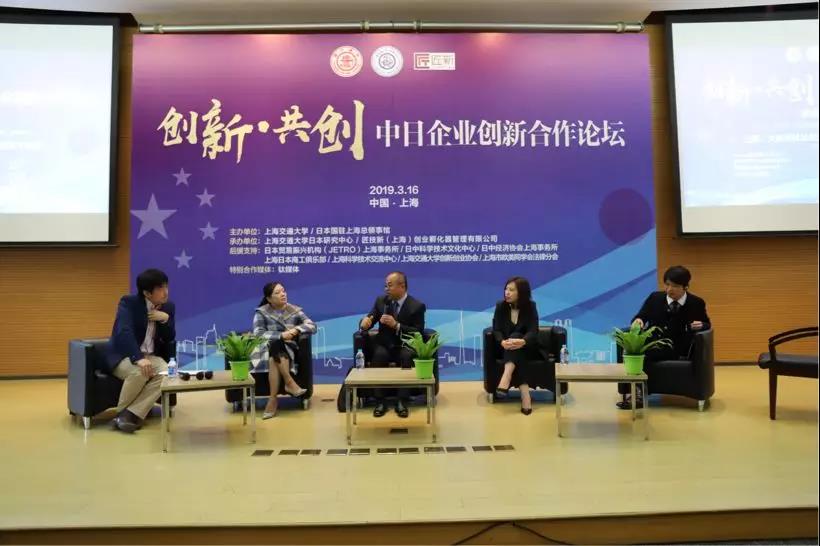
Round table discussion on "Innovation in the field of culture and entertainment and the possibility of joint creation between Japan and China"
Lin Haijian, the general manager of Guohe Investment, first put forward his own views on the development and shackles of the cultural industry. He believed that the development of the cultural industry should closely focus on the needs of young people in order to harvest the market.
Zhu Hui, Chairman of China Science and Technology Innovation Culture Group, also expressed his views on the cultural industry. She believed that China and Japan should strengthen exchanges, not only in medical insurance, but also in folk culture.
Cui Jingjing, the chairman of Huaya Film, pointed out that although the Japanese economy has entered a mature stage, the cultural industry has always been very strong, so China should strengthen cultural industry exchanges with Japan.
Yamauchi, CEO of Amuse Asia Business Unit, also shared his views on cooperation in the field of cultural industry. He believed that although Japan has an advanced cultural industry, it still has the problem of weak inclusiveness, which is not decisive enough compared with South Korea.
In this regard, Cui Jingjing, chairman of Huaya Film, and Lin Haijian, general manager of Guohe Investment, both believe that this is due to the cultural differences between China and Japan. Japanese culture is more cautious, while China pursues fast-food culture. Therefore, we should start cooperation from similarities, slowly break the ice, and finally achieve the goal of win-win cooperation.
The speeches made by the four guests not only put forward valuable suggestions for the direction of Sino Japanese cultural industry cooperation, but also brought a complete end to the morning half of the forum.
At 1:30 p.m., the second half of the forum was opened under the auspices of Tanaka, CEO of Jiangjixin (Shanghai) Entrepreneurship Incubator Management Co., Ltd.
The theme of the afternoon agenda is medical health. First of all, Zhao Hejuan, CEO of Titanium Media, made an introduction speech on the stage. Zhao Hejuan started from what she saw and heard in Japan, thinking about why Japan can become a long-lived country, and even the life of enterprises seems to be longer than that of enterprises in other countries. "This is the power of energy and concentration." Zhao Hejuan said, "We still see that in this country, no matter the oldest company, the oldest inheritor, or the current young people, all have a very dynamic side. Not only that, the craftsman spirit of focusing on one thing to the extreme, the productivity that can bloom is unlimited, and the value that can be born is also unlimited." In this respect, Zhao Hejuan also extends to enterprises. She thinks that the spirit of cooperation in Japanese corporate culture may be one of the secrets: "Because of concentration and delicacy, more people will think about which aspects can be solved through openness and cooperation, which is also a secret for an enterprise to survive for a long time." To create value in cooperation and compete for opportunities in cooperation, Chinese enterprises still have a lot of experience to learn from, to some extent, to communicate more with Japanese friends, create excellent works, and have our own scientific and technological strength for innovation, so that we can have more voice on the international stage and let everyone enjoy Chinese things, just as we enjoy Japanese things.

Zhao Hejuan, CEO of Titanium Media, made an introduction speech
Ms. Zhao Hejuan's speech was unanimously agreed by representatives of Chinese and Japanese enterprises. In the subsequent roadshow for representatives of emerging Japanese enterprises, the Japanese representatives also demonstrated the characteristics of Japanese enterprises.
The first is Masao Kobayashi, president of the Japanese branch of Triple W Japan Co., Ltd. He showed the equipment developed by Triple W Japan Co., Ltd. to predict the excretion time. "We hope that people can liberate our patients from diapers. There are 500 million people in the world who need to use diapers, and the elderly are the largest group. Among the elderly over 65 years old, people who use diapers are three times more likely to fall down than ordinary people. We have medical data to prove that the proportion of deaths has also increased, so we have developed a product to solve this problem." After elaborating the current market demand of this equipment, Kobayashi Zhengdian took out the product to demonstrate the operation and principle of the product. "Stick the ultrasonic probe to the lower abdomen to measure the filling degree of urine in the bladder, so as to predict the time of urination. It is also equipped with Bluetooth, which can be connected to our mobile phones. When the bladder reaches a certain filling degree, the APP will remind the person to go to the toilet." Kobayashi Zhengdian also studied China's market and national conditions, pointing out that the equipment of China's nursing homes is not yet complete, and Chinese society also disapproves of sending the elderly to nursing homes. In this regard, he made a series of prospects for the future and the prospects of China Japan cooperation. He believed that if there were good partners in China to promote such products, it would certainly bring convenience to the elderly in their old age.
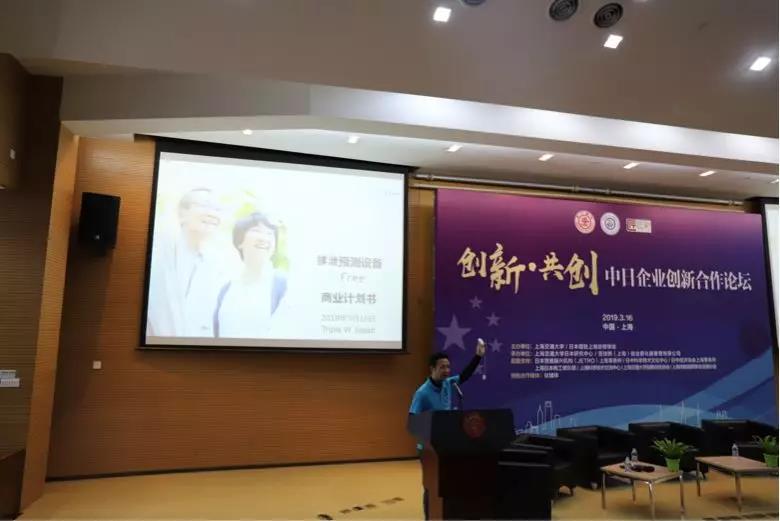
President of Japan Branch of TripleW Japan Co., Ltd., Masao Kobayashi, demonstrated the excretion prediction equipment
The second presenter is Naoki Taniguchi, CEO of HoloEyes Co., Ltd. He brought a VR wearable device that can be used for medical research. He said that the device developed by HoloEyes can promote diagnosis and treatment through 3D images scanned by CD. Through 3D images, doctors can more accurately understand the patient's situation and make accurate judgments, reduce medical risks and costs, and also achieve efficient medical treatment tailored to the situation. On the forum, Mr. Taniguchi played a consultation video of liver surgery. In the video, doctors used scanning technology when planning the operation. When they wore VR devices, they saw human structures such as blood vessels and bones that were difficult to see in 2D images.
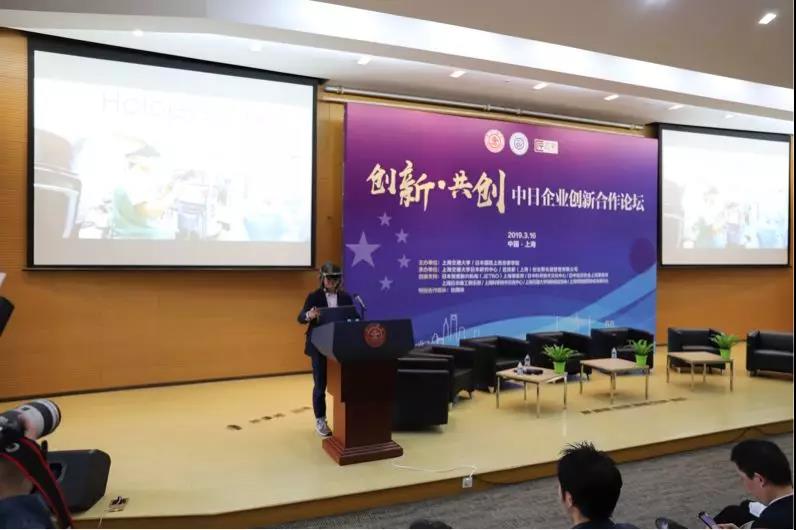
Hiroshi Tanguchi, CEO of HoloEyes Co., Ltd., demonstrates VR wearables
He also said that this technology has been able to support remote consultation, and doctors in Shanghai and Kyoto can discuss cases together through VR technology. Therefore, this product can bring together the world's top medical talents into a greater force to benefit more patients. He said that the purpose of coming to Shanghai this time is to find partners to enable this technology to cross borders.
The last presenter is O: Ryuya Yamamoto, CEO of the limited company. O: The company launched a sleep monitoring service for enterprises. Due to the work pressure and lifestyle in Japan, many people are seriously short of sleep, which is not only harmful to health, but also dangerous for enterprises. "If we can build an objective sleep database, all the problems will be clear at a glance." Mr. Gumoto demonstrated their O: SLEEP system. "Among the employees who use our APP, if we find that some people are not sleeping well, we will recommend the services of relevant doctors to them. The specific approach is that we put the smartphone next to the pillow, and the phone can detect the vibration of the bed through the sensor, and calculate the relevant data, which can be used to analyze the problem of this person's sleep." In addition, this app can not only monitor people's sleep, but also provide timely and targeted suggestions on sleep quality problems to help people improve their sleep quality and get better rest. Whether in China or Japan, young people, as the mainstay, have all kinds of sleep problems. Mr. Gumoto believes that if the hidden dangers are solved in a timely manner, it will play a positive role for individuals, enterprises and even the whole society.
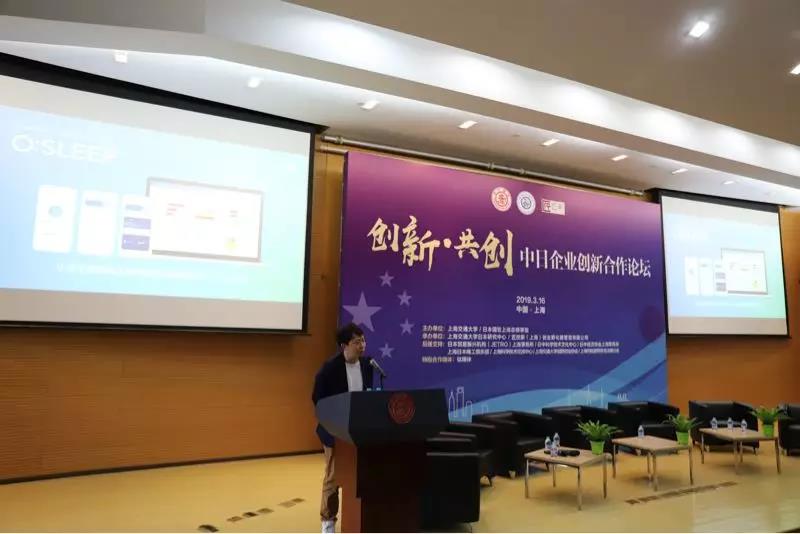
O: CEO Tanoto Runzai of the limited company displays sleep monitoring products
After listening to the wonderful speeches made by three representatives of Japanese enterprises, Li Xiaojun, the director of the West Taihu Lake National Medical Device International Innovation Park, the representative of Chinese enterprises, also expressed his feelings. The theme of his speech was "medical device innovation and government response", which briefly described the current status of China's medical enterprise industry. Director Li introduced the key products with major breakthroughs in the field of medical enterprises, such as high-throughput tumor sequencing kits, artificial ears, etc. It can be seen that China's medical enterprises are also developing rapidly. However, under the bright spot, there are still shortcomings: there are problems in the distribution of the interests of the market's innovation subjects, which directly leads to the lack of innovation motivation; The price of domestic medical devices and equipment is low; In order to ensure the safety of surgery, domestic doctors prefer to use imported medical products, which has a certain impact on the sales of domestic medical enterprises; Finally, there are few reviewers from the administrative examination and approval authorities and the Drug Administration, and the development speed is also slow.
He said that the government has taken corresponding measures in response to this domestic situation. It includes the approval of medical enterprise innovation, the pilot of medical system, and special personnel. Through a series of measures, production and service can form an effective linkage and further promote industrial development.

Li Xiaojun, Director of West Taihu National Medical Device International Innovation Park, gave a special report
Subsequently, Li Zhongfei, the director of the Investment Promotion Bureau of Yangzhou National High tech Industrial Development Zone, the representative of the Chinese department, also made a special report on the stage.
Director Li Zhongfei highlighted the bio health industry that Yangzhou High tech Development Zone is committed to building. At present, biological health is the trend of the times and should be developed into a key industry. In the past five years, Yangzhou High tech Development Zone has formed a trend of industrial accumulation and talent gathering based on the idea of leading enterprises and high-end talents. The park has also set up an industrial R&D center with Nanjing University. At present, there are more than a dozen projects under construction, with a total investment of 5 billion yuan.
When it comes to prospects, Director Li Zhongfei said: "Next, we should dare to think and act, with anti-tumor and animal vaccines as the main direction, and strive to become an important base for protein drugs. Next, we should establish a stronger industrial fund. To support the development of the park, we have also created an industrial fund of 1 billion yuan, and we have also introduced venture capital and venture capital to guide the development of enterprises in a market-oriented way. Third, we need to recruit dynamic industrial talents, and we will pay attention to Whether there is an incentive to invest in excellence ahead of each project, and whether there is follow-up investment. Our park will also provide some financial support according to the situation. Fourth, we need to build a service-oriented highland. First of all, we need to be honest. In the process of communication, as long as things are settled, they must be implemented and fulfilled. " Finally, Director Li Zhongfei also invited guests to visit Yangzhou to experience the beautiful food and feel the pulse of the new era of Yangzhou.
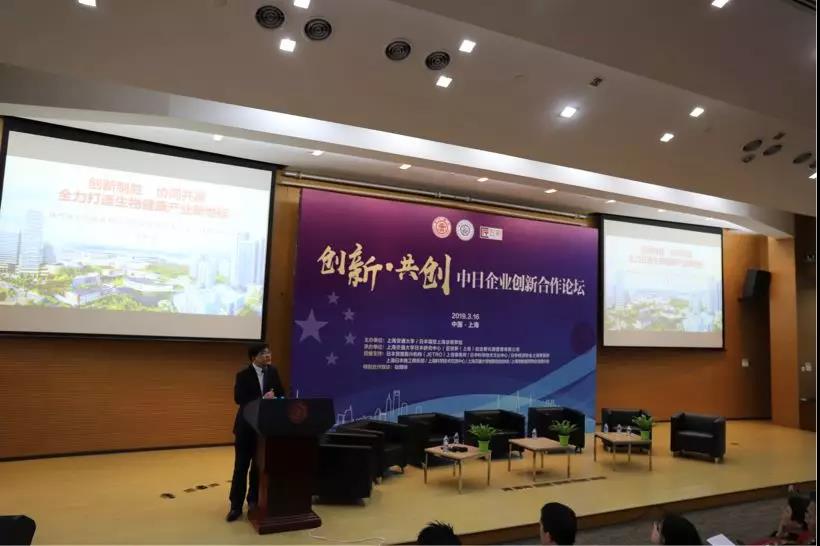
Li Zhongfei, Director of Investment Promotion Bureau of Yangzhou National High tech Industrial Development Zone, made a special report
After several representatives finished their speeches, they entered the round table discussion. Under the auspices of Zhou Qi, President of China Science and Technology Innovation Culture Group, Masao Kobayashi, President of Japan Branch of Triple W Japan Co., Ltd., Naoto Taniguchi, CEO of HoloEyes Co., Ltd., O: Runzai Tanmoto, CEO of the Co., Ltd., Yu Jiaxiang, Deputy General Manager of Pudong Science and Technology Innovation Group, Wu Bin, Deputy Director of Equipment Development Department of Sinopharm Holdings, CEO of Pegasus Qian Qian, a partner of Pegasus Capital, had a heated discussion with the interviewers on "innovation in the health field and the possibility of 'co creation' between Japan and China".
During the discussion, six interviewers first made speeches on medical products and medical devices. Mr. Kobayashi believes that China's nursing industry has not yet reached the world's leading maturity. He hopes to take himself as a bridge to bring Japanese nursing technology into China, and integrate the characteristics of Chinese nursing technology to learn from each other. Mr. Gukou said that at present, China's digital technology has made rapid progress. WeChat has replaced business cards as a tool for people to know each other. This kind of digitization can also be used in the medical industry. In response, the Chinese side and the negotiator said that Japanese enterprise representatives had brought good technologies and ideas today, but it was not easy to enter the Chinese market. If we want to promote in the Chinese market, we need the power of capital. The premise is to quickly cut into the end users in the market and form sales. Only when there is sales can there be future development. From the perspective of co creation, Chinese and Japanese enterprises may achieve unexpected results by doing different jobs separately. If we can rely on the leading enterprises in China's medical industry to integrate a set of overall implementation plans under its architecture system, we can help small enterprises to enter this system. This co creation point has great inspiration for Japanese start-ups who want to enter the Chinese market.
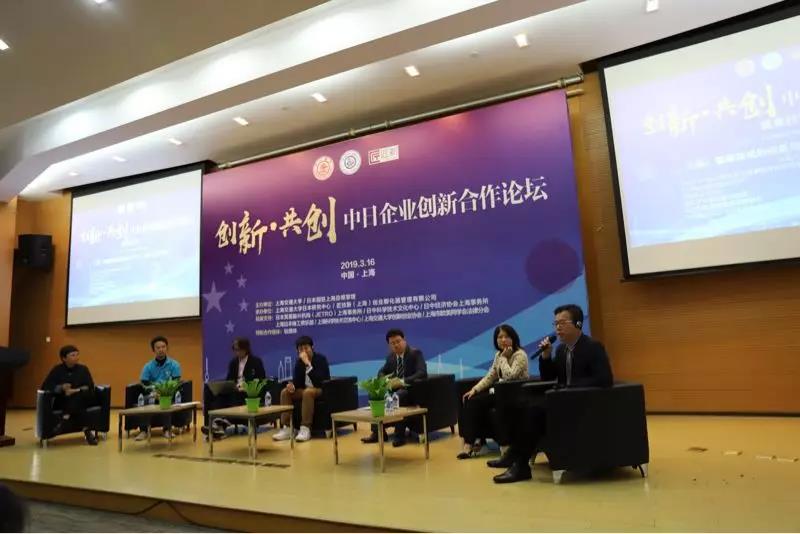
Round table discussion on "Innovation in the field of health and the possibility of" co creation "between Japan and China"
From cooperation to investment, and from technology to competition, the six negotiators had a face-to-face vision of joint creation between China and Japan, and they have gained a lot both on and off the stage.
After the round table discussion, Ding Jian, Secretary of the Party Committee of the School of Foreign Languages of Shanghai Jiao Tong University and Deputy Director of the Japan Research Center, presided over the summary and closing speech of the forum. He said: "I deeply feel that to achieve the theme of today's forum, innovation and common innovation, the key is to cultivate a large number of talents in China and Japan who understand, understand and tolerate each other." He also expressed his deep gratitude to the guests and participants attending the forum for their support of Shanghai Jiaotong University and Japan Research Center.
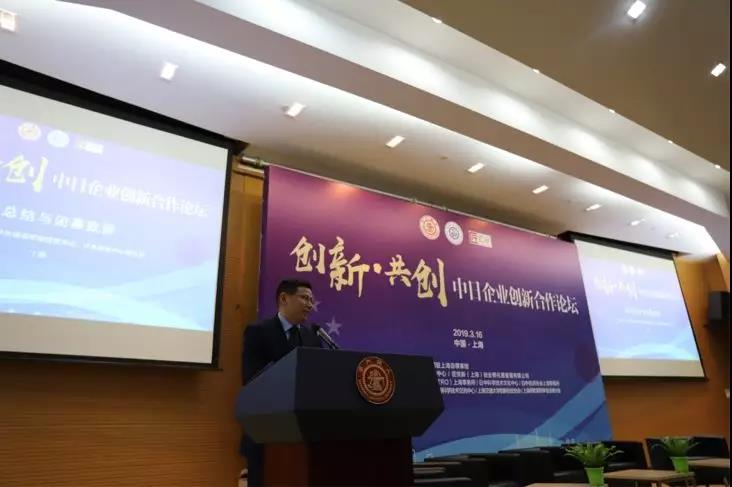
Ding Jian, Secretary of the Party Committee of the School of Foreign Languages of Shanghai Jiao Tong University and Deputy Director of the Japan Research Center, presided over the summary and closing speech of the forum
Afterwards, Ji Weidong, director of Japan Research Center of Shanghai Jiaotong University, made a concluding speech. Director Ji Weidong expressed his heartfelt thanks to the delegates present, expressed his inner joy at the smooth holding of the forum, and talked about his five feelings.
He said that the first impression is that China used to rely on the demographic dividend to develop, but now it is generally believed that the demographic dividend is nearly exhausted, but the content of this forum suddenly makes people feel that there is a second demographic dividend between China and Japan. The second demographic dividend can be generated by investment, especially in health care and financial management, in both Japan's mass generation and China's reform and opening up generation. The second impression is that although the guests here come from different countries and different fields, they can feel familiar with the topics discussed at a glance. This is enough to illustrate the strong complementary relationship between China and Japan. Japan is famous for its craftsmanship spirit, while China has a strong business spirit, one can manufacture and the other can sell, but at present, there is no good combination. How to combine each other's advantages is a very important basis for China and Japan to further strengthen the complementary relationship and form a strategic partnership in the future. The third impression is that the opportunities and space for cooperation have been presented in front of us. Just as the VR products brought by HoloEyes Co., Ltd. have transformed two-dimensional space into three-dimensional space, new cooperation space between China and Japan has also been presented. China and Japan have the possibility of in-depth cooperation in third-party cooperation, including medical industry cooperation, and examples of complementarity are presented today. For example, the medical industry city plans in Kobe, Yamanashi and other places in Japan can be fully connected with the medical health science and technology park plans in Changzhou and Yangzhou to form a complementary and win-win partnership. However, China, South Korea and Japan are highly complementary in beauty, which can promote the development of some remote areas in Japan. China and Japan can even consider setting up a special medical zone. For example, it only takes two or three hours for seriously ill patients to fly from Hongqiao Airport to Kobe Airport, while Kobe's medical center is near Kobe Airport, which can enable patients to be hospitalized immediately after getting off the plane. The fourth impression is that technology and capital are well combined. High technology hopes to get capital investment, and capital also hopes to find an ideal partner, so information communication becomes very important. The fifth impression is that an important mission of the Japan Research Center of Shanghai Jiao Tong University is to promote high-end dialogue between China and Japan in the field of economics and law. At the 40th anniversary of the conclusion of the Sino Japanese peace and friendship treaty, the Sino Japanese dialogue should enter the micro level, the enterprise level. Today is an experiment, which makes the Japanese Research Center a platform for the integration of industry, education and research, and may even become a bridge for economic cooperation between China and Japan. Finally, Director Ji Weidong expressed his expectations for the future and hoped that such a cooperation forum could be held frequently.
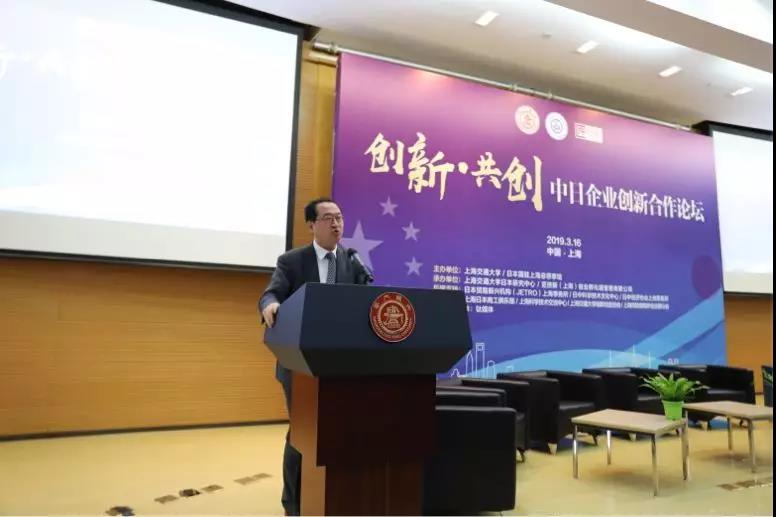
Ji Weidong, Director of Japan Research Center of Shanghai Jiaotong University, made a concluding speech
At the end of the forum, Fukuda Gaogan, Minister of Politics, Economy and Culture of the Consulate General of Japan in Shanghai, delivered a closing speech.
Minister Fukuda Gao Gan expressed his thanks to the representatives from all walks of life who participated in this activity and said: "Innovation is not an invention made by one person, it is not a creation made by one person. It is an innovation when there is a team and many people want to participate in the cause. Today we have learned a lot of information. Innovation needs cooperation. Today, everyone is the leader of innovation. I hope we can work together to promote our relationship to the real" co creation "era!"
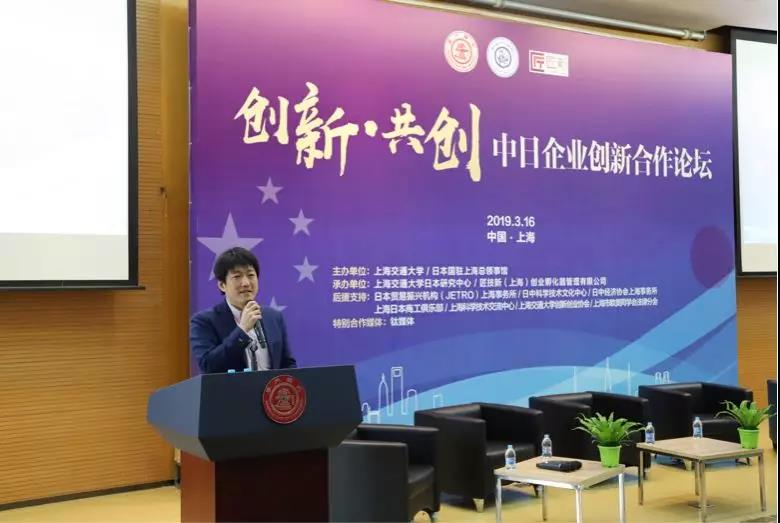
Fukuda Gaogan, Minister of Politics, Economy and Culture of the Consulate General of Japan in Shanghai, delivered a closing speech